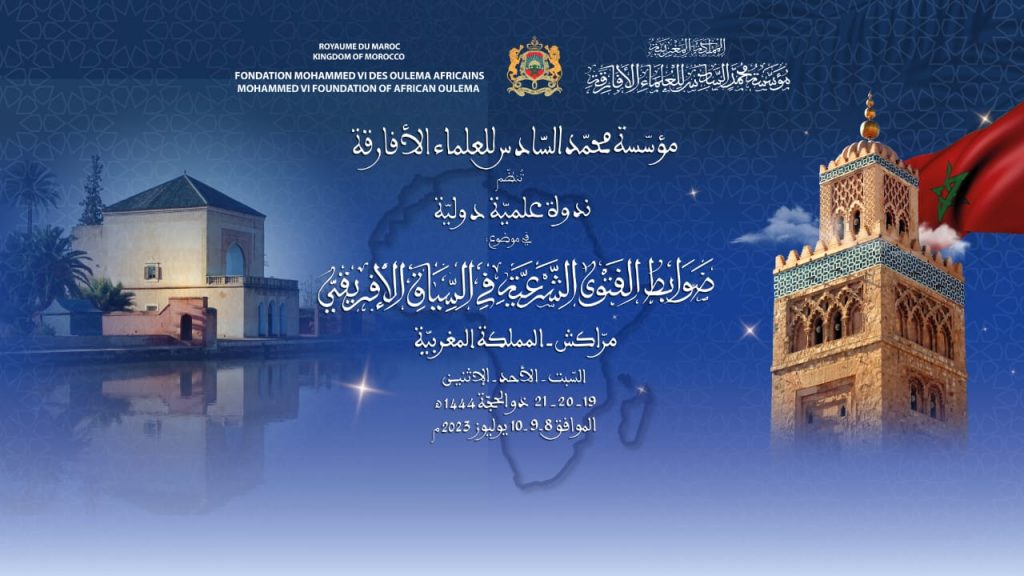Sharia-related Fatwa Rules in the African Context – Press release

The Mohammed VI Foundation of African Oulema organizes an International scientific symposium on: Sharia-related Fatwa Rules in the African Context in Marrakesh, Kingdom of Morocco on Saturday, Sunday, Monday 19-20-21 Dhul-Hijjah 1444H Corresponding to 8-9-10 July 2023.
On the occasion of the convening of this important international scientific symposium, His Majesty King Mohammed VI – may God assist Him – will send a Royal Message to the religious scholars taking part in this event. The attending religious leaders represent fatwa institutions and Supreme Islamic Councils from Africa, Asia, Europe and South America. Also attending the symposium are heads and members of the Foundation’s Sections in African countries, in addition to a group of male and female scholars from the Kingdom of Morocco.
The symposium is organized following the recommendations made by the Higher Council of the Mohammed VI Foundation of African Oulema at its fourth session held in Fez on 22-23 Rabi’ al-Awwal 1444H, corresponding to 19-20 October 2022 concerning the convening of scientific and intellectual seminars on the situation of fatwas in Africa.
This international scientific symposium is part of the endeavors made by the Mohammed VI Foundation of African Oulema, under the leadership of the Commander of the Faithful, His Majesty King Mohammed VI, the President of the Foundation – may God assist him – to pool the efforts of African religious scholars and unite them to preserve religion from the corruption of extremists, the distortion of falsifiers and the interpretations of the ignorant. The aim is to make sure the tolerant values of Islam serve African countries’ stability and development.
Aware of the importance of fatwas in Sharia-related issues, in Islamic sciences and in religious affairs, and being convinced that religious scholars are the ones who are qualified to respond to emerging issues and developments (nawazil) based on a deep understanding and proper interpretation of Sharia, the Mohammed VI Foundation of African Oulema believes there is an urgent need today to develop a solid, scientific approach to Sharia-related fatwas. Such an approach must be consistent with accepted legal principles and should serve as a shield against the scourges of extremism, radicalism, and interpretation – without due knowledge – of what God has ordained for mankind.
The symposium will address the following topics:
- Introduce the science of issuing fatwas and the connection with Sharia provisions;
- Highlight the status of fatwa in Islamic sciences;
- Shed light on the scientific and objective rules governing the issuing of fatwas;
- Emphasize the importance of fatwas in African societies;
- Draw attention to the actual situation of Sharia-related fatwas in African countries;
- Provide guidance on how to protect Sharia-related fatwas from extremist ideology;
- Illustrate the responsibility of muftis in refuting extremist, fanatic claims and tendencies.
The symposium will be attended by more than three hundred and fifty (350) male and female religious scholars from 72 countries:
African countries (50): Angola, Benin, Botswana, Burkina Faso, Burundi, Cameroon, Central African Republic, Chad, Comoro Islands, Côte d’Ivoire, Democratic Republic of the Congo, Djibouti, Egypt, Eswatini, Ethiopia, Gabon, Gambia, Ghana, Kenya, Lesotho, Liberia, Libya, Mali, Madagascar, Malawi, Mauritania, Mauritius, Mozambique, Namibia, Niger, Nigeria, Republic of Congo, Republic of Equatorial Guinea, Republic of Guinea, Republic of Guinea-Bissau, Rwanda, Sao Tome, Senegal, Sierra Leone, Somalia, South Africa, South Sudan, Sudan, Seychelles, Tanzania, Togo, Tunisia, Uganda, Zambia, Zimbabwe.
Asian countries (7): India, Lebanon, Jordan, Maldives, Palestine, Sultanate of Oman, United Arab Emirates,.
European countries (14): Belgium, Bosnia-Herzegovina, Bulgaria, Croatia, Denmark, France, Germany, Greece, Italy, Montenegro, Netherlands, Serbia, Russia, Türkiye.
South America (1): Brazil
Organization of an Exhibition on: Fatwa Legacy in Morocco and Africa
On the sidelines of the international scientific symposium on “Sharia-Related Fatwa Rules in the African Context”, which will be held in Marrakesh by the Mohammed VI Foundation of African Oulema on 19-21 Dhul-Hijja 1444H, corresponding to 8-10 July 2023, an exhibition will take place and will feature representations of manuscripts pertaining to an aspect of the heritage on fatwa and other new matters or developments (nawazil) addressed by religious scholars from Morocco and some African countries.
The exhibition seeks to achieve the following objectives:
– Highlight the legacy relating to fatwa and nawazil existing in the Kingdom of Morocco and other African sister countries;
– Shed some light on scholarly interaction between Morocco and other African countries through the exchange of manuscript books and scholarly traditions;
– Showcase the splendor of manuscripts on fatwas and nawazil, a fact that illustrates the special care taken of this type of production.
This heritage pertaining to fatwas and nawazil reflects the uninterrupted efforts exerted in the field of Islamic jurisprudence to keep abreast of new issues and developments affecting Moslem societies. It is the work of well-established religious scholars who are recognized for their competence and for fulfilling fatwa conditions.
The exhibited pieces and items are but a fraction of the enormous heritage held by manuscript libraries and institutions in Morocco and other African countries in the field of fatwa, nawazil and other scholarly Islamic studies. The importance and value of this heritage needs to be highlighted, and efforts should be made to preserve and safeguard it so that it may be passed on to future generations across Africa.
The Mohammed VI Foundation of African Oulema wishes to extends sincere thanks to the institutions which kindly shared part of their holdings, namely:
- The Al-Qarawiyin Library, Fez
- The Hassania Library, Rabat
- The National Library, Rabat
- The library of Ahmed Baba Institute for Postgraduate Studies and Islamic Research, Timbuktu, the Republic of Mali
- Mama Haidara Library, Timbuktu, the Republic of Mali.
